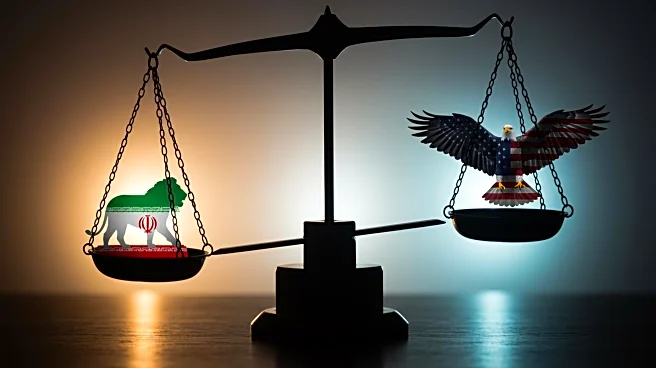What's Happening?
Iran's Supreme Leader, Ayatollah Ali Khamenei, has declared that Iran will not succumb to U.S. pressure in ongoing nuclear negotiations. In a recent statement, Khamenei emphasized that the issue with the United States is 'unsolvable' and criticized the expectation that Iran should be subservient to American demands. This declaration comes amid a prolonged standoff over Iran's nuclear program, which has been a point of contention between Iran and Western nations, particularly the United States. The Iranian leadership has consistently maintained that its nuclear ambitions are peaceful, while the U.S. and its allies have expressed concerns over potential weaponization. Khamenei's remarks underscore Iran's steadfast position in the face of international pressure, as the country continues to navigate complex geopolitical dynamics.
Why It's Important?
The ongoing tension between Iran and the United States over nuclear capabilities has significant implications for international security and diplomacy. Khamenei's defiant stance highlights the challenges in reaching a diplomatic resolution, which could affect global nuclear non-proliferation efforts. The situation also impacts regional stability in the Middle East, where Iran's nuclear ambitions are viewed with apprehension by neighboring countries. For the U.S., maintaining pressure on Iran is part of a broader strategy to prevent nuclear proliferation, but it also risks escalating tensions that could lead to further geopolitical instability. The outcome of these negotiations could influence U.S. foreign policy and its relations with allies who are also stakeholders in the nuclear agreement.
What's Next?
As Iran remains firm in its position, the international community, particularly the U.S. and European allies, may need to reassess their strategies in dealing with Iran's nuclear program. Diplomatic efforts could either intensify or stall, depending on Iran's willingness to engage in further negotiations. The potential expiration of existing nuclear agreements, such as the Joint Comprehensive Plan of Action (JCPOA), adds urgency to finding a resolution. Stakeholders may explore alternative diplomatic channels or increase economic sanctions to compel Iran to comply with international nuclear standards. The situation remains fluid, with potential for both diplomatic breakthroughs and increased tensions.











